UK scientists develop 10-minute blood test to diagnose diseases
UK scientists have developed a finger-prick blood test that can detect the proteins associated with a wide range of diseases from long Covid to Alzheimer’s in 10 minutes or less.
Attomarker, a spinout from the University of Exeter, “is revolutionising diagnostic technology and the potential of big data”, said chief executive Andrew Shaw as he demonstrated the new testing devices at the British Science Festival in Exeter.
The technology gave its first clinical results this year in diagnosing long Covid from the presence of six antibodies that showed the Sars-Cov-2 virus persisting in a patient’s body.
It is also being developed to detect “biomarker” proteins associated with female fertility, food allergy, diabetes and Alzheimer’s, and to fight antimicrobial resistance by distinguishing bacterial from viral infections.
At present, the technology, which delivers results within seven to 10 minutes, runs on a benchtop laboratory instrument. But next year Attomarker expects to launch a handheld device with a diagnostic cartridge connected to a mobile phone.
Shaw said the apparent similarity between Attomarker and Theranos, the fraudulent US blood-testing company founded by Elizabeth Holmes, “always comes up when I’m talking to investors. The difference is we’ve got the technology to work and demonstrated it, which they never did.”
The scale of funding was different too, he added. While more than $700mn was invested and lost in Theranos, Attomarker has raised £4.5mn since 2017 and hopes to raise another £3mn by the end of 2023. A larger Series A funding round will follow in the next two years.

Attomarker’s technology works with gold nanoparticles printed on an array of sensor spots. The nanoparticles on each spot are treated to bind to a particular protein, and the array can scan for up to 20 biomarkers from a blood sample of just 0.01ml. In contrast, a routine hospital blood test takes a 30ml sample.
When the spots are illuminated from below as blood flows over the array, the nanoparticles scatter the light with a pattern that indicates the quantity of biomarkers that has stuck to the surface.
With several applications under development, Shaw singled out three that he expected to have great commercial potential.
One is a device capable of detecting nine different biomarkers associated with Alzheimer’s disease, including five variants of tau protein and two of beta amyloid protein, will be launched next year.
Another is an “infection chip” to tell whether an infection with non-specific symptoms is caused by bacteria that can be treated with antibiotics or by viruses, which do not respond to antibiotics. A third is capable of detecting hormones associated with fertility and menopause.
The mobile device is likely to cost about £300, Shaw said, with each test array or chip costing between £10 and £20. “The route to market will be private clinics to begin with and then the NHS later,” he said.
This story originally appeared on: Financial Times - Author:Clive Cookson



























